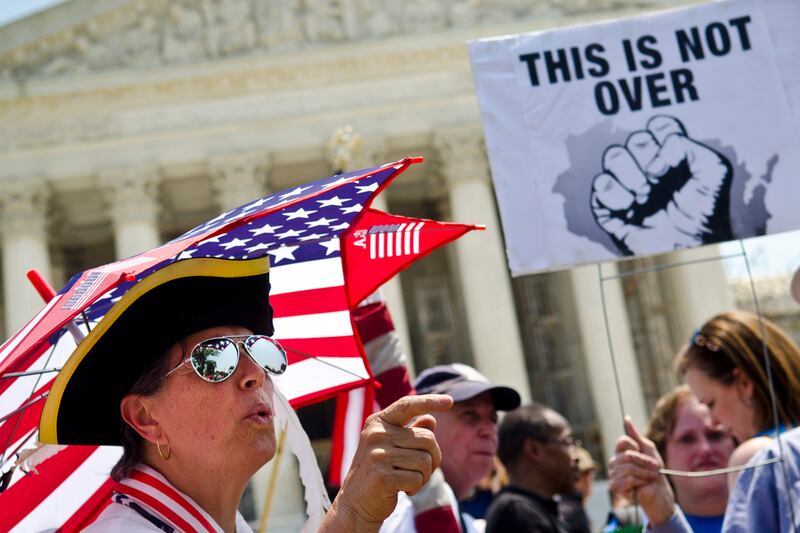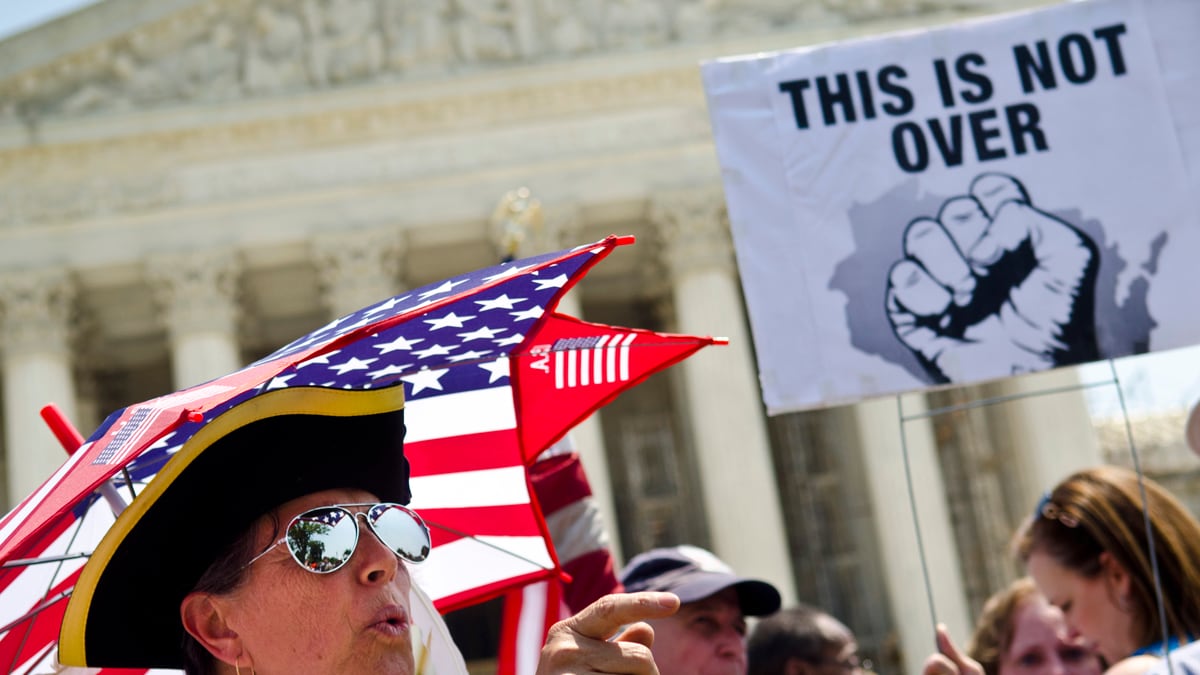Conservatives shouldn’t pretend that the Supreme Court decision on the Affordable Care Act isn’t a victory for President Obama. It is, and the president will naturally claim vindication for his policies.
But for Obama, today’s judgment amounts to a victory in a battle, not the war. To win that war—to block the implementation of sweeping legislation that would cripple the economy and damage the republic—Republicans need to shift strategy, not abandon our goals.

Yesterday, we argued that Obamacare was ill-advised and unconstitutional. Today we know that it is constitutional (the justices get to decide that under our system, not legal analysts on Fox News, or at the National Review, or even at The Daily Beast). But it’s still ill-advised.
And, more to the point, Obamacare is still unpopular. It won’t suddenly become more popular now that the Supreme Court has formally endorsed the Republican contention that Affordable Care Act actually mandates a massive new tax on the middle class. If nothing else, today’s decision makes it officially, undeniably clear that the administration can’t pay for its wildly increased spending programs by imposing new burdens on the wealthy alone. The American people may have been confused on the subject of the “individual mandate” but every citizen understands what it means to face a new tax.
As the campaign unfolds, how can the president continue to deny that he has imposed such a tax when the Supreme Court ruled that he has—and it’s on that basis alone that his signature achievement counts as constitutional?
While conservatives passionately hoped that the high court would euthanize Obamacare on Thursday morning—or at least cut out its heart while encouraging Congress to attempt an emergency transplant—they can at least take comfort in some aspects of the emerging situation.
First, all right-wingers with integrity should feel encouraged by the fact that judicial restraint is alive and well. Justice Roberts’s decision made it clear that he wanted desperately to avoid “legislating from the bench”—and conservatives should of course applaud that instinct. Roberts and other opponents of what Republicans rightly deride as “judicial tyranny” resisted the idea that nine unelected jurists (or five of them, to comprise a majority) should instantaneously undo 2,700 pages of ridiculously detailed legislation painstakingly passed by 535 elected representatives over the course of nearly two years of debate.
The problem was that helping this new law survive its legal challenges might also lead to a dangerous expansion of the Commerce Clause—suggesting that the congressional power to regulate interstate commerce now meant that the national legislature could compel every American to eat broccoli, as Justice Scalia speculated in oral arguments.
By justifying the law under the taxing power, the court still forbids direct compulsion by Congress concerning individual decisions on broccoli consumption. But the Supremes do say that the feds can impose taxes on every sort of food other than broccoli—so if you don’t decide to eat the green stuff, you’ll have to pay. By the same token, the Supremes say here that the national government can’t force you to buy insurance, but they do have the right to say that if you don’t buy it, you’ll face an extra tax.
But this conclusion also aligns the highest court in the land with the charge that the administration was profoundly dishonest when it argued, again and again, that Obamacare imposed no new taxes on the American people. The decision today put a definitive end to such dissembling. The argument about health-care reform can now focus more clearly on whether the administration plan is worth the crushing costs, without the mendacious pretense that the public would get something for nothing.
It’s understandable that President Obama wants to put an end to arguments that he can’t win and his best ally in that effort is public weariness with the whole exhausting debate. In his statement after the decision, the president trotted out his new favorite line about “going forward, not backward” and avoiding, above all, going back to the fights of two years ago. He wants to convince the electorate that Obamacare is now a done deal and that further discussion is pointless and a total waste of time.
In response, Republicans must make clear that we’re not trying to unravel existing and smoothly functioning reforms or threatening to shatter our current system of medical care, but trying to preserve it.
In other words, we want to avoid destructive change, not to undo it. The inconvenient truth for the administration is that very little of their highly touted overhaul has actually taken effect: the most significant aspects of the Affordable Care Act won’t hit with full force until 2014 or even later.
This is a crucial point: we’re still fighting to prevent a disastrous mistake from damaging our country, rather than working to repair the effects of that mistake. It’s not too late by any means to stop Obamacare.
The Supreme Court decision means that we can’t rely on five conservative justices to halt this monstrous plan. But we can still rely on 305 million Americans, or some 200 million potential voters who must decide in November whether they want a massive new bureaucracy and crushing new taxes (yes, taxes) imposed on them in the name of health-care reform
Mitt Romney’s statement on Thursday makes clear that he still feels confident that voters will make the right choice on this, now that the court has handed that choice back to the people. Romney also benefits from the focus on “repeal and replace”: the upcoming debate will concentrate on deciding yes or no on Obamacare, not disputing the details of some Romney alternative that he would have been forced to describe with much greater specificity had the court invalidated all or part of the administration’s plan.
Conservatives can’t claim some great triumph for our arguments or for our cause in the Supreme Court decision announced today. But with a far more significant decision looming in November, there’s no reason at all for despair or surrender.






